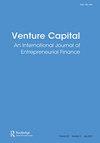初生大学生创业:语境的作用
IF 2.8
4区 管理学
Q2 BUSINESS, FINANCE
引用次数: 1
摘要
本文提供证据表明,情境可能会影响大学生的创业过程不同,取决于活动的类别和地区。具体来说,它在考虑创业过程的不同类别的同时,探讨了大学和国家背景的影响。我们的方法将创业过程分为三类(商业规划、与外部环境的互动和融资)、四种上下文定义(大学、工业技术、制度政策和文化)和三个区域(欧盟、拉丁美洲和亚非)。我们利用了全球大学创业精神学生调查(guess)项目的主要数据集,该数据集包含来自21个国家的7628名新生企业家,并辅以世界经济论坛的全球竞争力指数、全球创业指数和全球领导力和组织行为有效性项目的一系列国际指数。一般来说,大学环境对欧洲和亚非学生的创业活动有积极影响。工业和技术背景以及体制和政策背景根据活动和区域发挥相关作用(有时是积极的或消极的)。最后,文化背景也呈现出复杂的结果,其影响因创业活动的类型和地区而异(积极和消极)。本文章由计算机程序翻译,如有差异,请以英文原文为准。
Nascent entrepreneurship in university students: the role of the context
ABSTRACT This paper offers evidence that the context might influence a university student’s start-up process differently, depending on the category of activities and regions. Specifically, it explores the influence of university and national contexts while considering the different categories of the start-up process. Our approach divides the start-up process into three categories (Business planning, Interaction with the external environment, and Financing), four context definitions (University, Industry-technological, Institutional-policy, and Cultural), and three regions (European Union, Latin America, and Asian-African). We drew on the primary dataset of the Global University Entrepreneurial Spirit Students’ Survey (GUESSS) project that contains 7,628 nascent entrepreneurs from 21 countries, which we complemented with a set of international indexes from the World Economic Forum’s Global Competitiveness Index, the Global Entrepreneurship Index, and the Global Leadership and Organizational Behavior Effectiveness project. Generally speaking, the University context positively influences the start-up activities of students in Europe and Asia-Africa. The Industry and technological context and the Institutional and policy context play a relevant role (sometimes positive or negative) depending on the activity and region. Finally, the Cultural context presents mixed results too, and its influence varies (positively and negatively) depending on the kind of start-up activities and the region.
求助全文
通过发布文献求助,成功后即可免费获取论文全文。
去求助
来源期刊

Venture Capital
BUSINESS, FINANCE-
CiteScore
4.10
自引率
16.70%
发文量
21
期刊介绍:
Venture Capital publishes cutting edge research-based papers from academics and practitioners on all aspects of private equity finance such as: •institutional venture capital •informal venture capital •corporate venture capital •public sector venture capital •community venture capital It also covers all aspects of the venture capital process from investment decision to exit, including studies on: •investment patterns •investment decision-making •investment performance •realisation of investment value exit routes (including the relationship with junior capital markets such as NASDAQ, EASDAQ, AIM and Nouvelle March). •economic impact and public policy
 求助内容:
求助内容: 应助结果提醒方式:
应助结果提醒方式:


